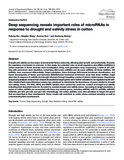Deep sequencing reveals important roles of microRNAs in response to drought and salinity stress in cotton
Author
Xie, Fuliang; Wang, Qinglian; Sun, Runrun; Zhang, Baohong
Abstract
Drought and salinity are two major environmental factors adversely affecting plant growth and productivity. However, the regulatory mechanism is unknown. In this study, the potential roles of small regulatory microRNAs (miRNAs) in cotton response to those stresses were investigated. Using next-generation deep sequencing, a total of 337 miRNAs with precursors were identified, comprising 289 known miRNAs and 48 novel miRNAs. Of these miRNAs, 155 miRNAs were expressed differentially. Target prediction, Gene Ontology (GO)-based functional classification, and Kyoto Encyclopedia of Genes and Genomes (KEGG)-based functional enrichment show that these miRNAs might play roles in response to salinity and drought stresses through targeting a series of stress-related genes. Degradome sequencing analysis showed that at least 55 predicted target genes were further validated to be regulated by 60 miRNAs. CitationRank-based literature mining was employed to determinhe the importance of genes related to drought and salinity stress. The NAC, MYB, and MAPK families were ranked top under the context of drought and salinity, indicating their important roles for the plant to combat drought and salinity stress. According to target prediction, a series of cotton miRNAs are associated with these top-ranked genes, including miR164, miR172, miR396, miR1520, miR6158, ghr-n24, ghr-n56, and ghr-n59. Interestingly, 163 cotton miRNAs were also identified to target 210 genes that are important in fibre development. These results will contribute to cotton stress-resistant breeding as well as understanding fibre development.
Subject
Date
2015-02
Citation:
APA:
Xie, Fuliang, & Wang, Qinglian, & Sun, Runrun, & Zhang, Baohong. (February 2015).
Deep sequencing reveals important roles of microRNAs in response to drought and salinity stress in cotton.
Journal of Experimental Botany,
66(3),
789-
804. Retrieved from
http://hdl.handle.net/10342/5446
MLA:
Xie, Fuliang, and Wang, Qinglian, and Sun, Runrun, and Zhang, Baohong.
"Deep sequencing reveals important roles of microRNAs in response to drought and salinity stress in cotton". Journal of Experimental Botany.
66:3. (789-804),
February 2015.
April 18, 2024.
http://hdl.handle.net/10342/5446.
Chicago:
Xie, Fuliang and Wang, Qinglian and Sun, Runrun and Zhang, Baohong,
"Deep sequencing reveals important roles of microRNAs in response to drought and salinity stress in cotton," Journal of Experimental Botany 66, no.
3 (February 2015),
http://hdl.handle.net/10342/5446 (accessed
April 18, 2024).
AMA:
Xie, Fuliang, Wang, Qinglian, Sun, Runrun, Zhang, Baohong.
Deep sequencing reveals important roles of microRNAs in response to drought and salinity stress in cotton. Journal of Experimental Botany.
February 2015;
66(3):
789-804.
http://hdl.handle.net/10342/5446. Accessed
April 18, 2024.
Collections

